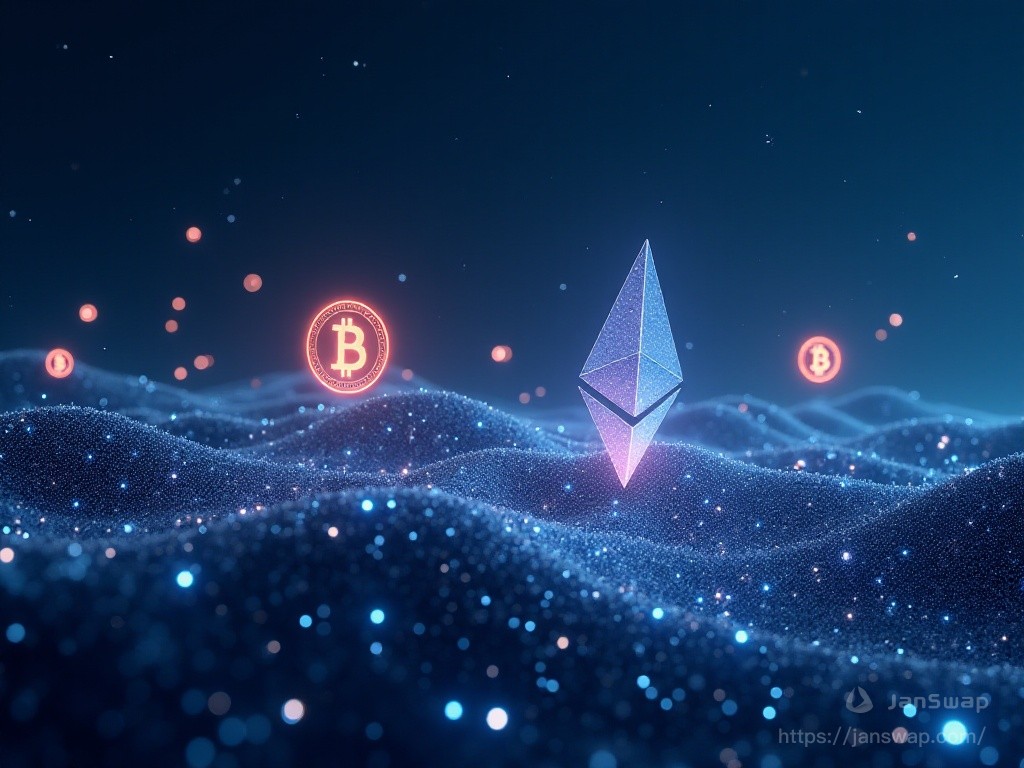

Opening Chat
Hi everyone, I'm Han from the blockchain space, a post-95 crypto player. I still remember the first time I heard about Bitcoin - it was in my college dorm when my roommate excitedly shared his latest "discovery" with me. Honestly, I found it fascinating at the time - a currency that could complete transactions without banks? Wasn't that just a fantasy?
With this curiosity, I began my journey exploring cryptocurrencies. To be honest, I was completely lost at first, with all those technical terms seeming like hieroglyphics. I remember once asking "What is a smart contract?" in a crypto group chat, only to be bombarded with technical terms like Solidity and EVM, which confused me even more. But that's okay - we're here to progress step by step from beginner level. Today, I'll share my journey with you in the most straightforward way.
Understanding Cryptocurrency
Cryptocurrency is truly something interesting. It's like "digital gold" for the internet age, but even more magical than gold. Think about it - gold is at least physical, but cryptocurrency is entirely made of code. It can circulate globally without banks or governments - isn't that cool?
Let me give you a simple example. If you want to transfer money to a friend overseas, traditional banks might take several days and charge high fees. But with cryptocurrency, it might be done in minutes with much lower fees. This is why more and more young people are getting interested in this field.
The cryptocurrency market is quite huge now. Besides the well-known Bitcoin, there's Ethereum, Binance Coin, and others. Each coin has its own characteristics and use cases. For instance, Ethereum can not only transfer value but also run smart contracts, making it a foundation platform for many innovative applications.
Last year, I met a friend who works with NFTs - he published a series of digital artworks on Ethereum that sold really well. This made me realize that cryptocurrency applications go far beyond simple payments. It's more like a completely new digital economic system full of endless possibilities.
Security Mechanisms
When it comes to cryptocurrency security, this is a particularly important topic. I often see newcomers asking: "Is cryptocurrency safe? Can it be stolen by hackers?" Actually, once you understand the basic principles, you'll find the system is quite cleverly designed.
Every user has two key things: a public key and a private key. The public key is like your bank account number - you can share it freely; the private key is like your password - it must be kept strictly confidential. These two keys have an inseparable mathematical relationship, but knowing the public key cannot derive the private key - that's the charm of cryptography.
I have a profound lesson to share with everyone. Last year, a crypto veteran I knew stored his private key in his phone's notes app, then lost his phone - millions in assets just disappeared like that. So I strongly recommend everyone use professional hardware wallets to store private keys, don't think it's too much trouble.
There are many hardware wallets available now, like Ledger, Trezor, etc. They're like specialized USB drives for storing cryptocurrency - even if your computer has a virus, it won't affect your assets. I've been using a Ledger for over two years with quite good experience.

How to Acquire
At this point, I'm sure many people want to ask: how can you get cryptocurrency? There are actually quite a few ways - let me explain in detail.
First is through cryptocurrency brokerage services. This method is best for beginners because the interface is friendly and operations are simple. For example, with the Crypto.com app, you just need to link a bank card to buy cryptocurrency directly with fiat money. It's like a digital currency version of Alipay - very convenient.
The second way is through cryptocurrency exchanges. This is more professional, like Binance, OKX, and other platforms. They offer more trading pairs and financial instruments, like futures and leverage trading. However, I suggest beginners avoid these high-risk methods and stick to spot trading.
Decentralized finance platforms, or DeFi, have been particularly hot these past two years. These platforms don't require account registration at all - you just need to connect your cryptocurrency wallet to use them. For example, Uniswap, a decentralized exchange, lets you swap tokens directly on the blockchain.
I was quite nervous the first time I used a DeFi platform, worried I'd lose my money if I made a mistake. After gradually exploring, I found it quite interesting. You can participate in liquidity mining - providing your tokens to the platform to help other users trade and earn fee income.

Technical Development
Speaking of technical development, this field truly changes daily. Take Chain Scout, which has been particularly hot recently - it's a great tool that's been a blessing for Web3 developers.
Its most powerful feature is analyzing users' on-chain behavior. For example, if you're an NFT project developer wanting to know which users are most likely to be interested in your project, Chain Scout can provide precise user profiles by analyzing these users' historical transaction records.
I have a friend who makes Web3 games who used Chain Scout for user analysis and discovered their most active user group was actually Asian users aged 25-35. With this data, they could adjust their product strategy and marketing plans accordingly.
Web3 projects now emphasize user experience, which is why tools like Chain Scout are so popular. It not only helps developers better understand users but can also predict market trends - it's really an essential tool for project teams.
Practical Experience Sharing
After all this theory, let me share some practical experience. I remember my first time buying Bitcoin - it was quite a thrilling experience. Bitcoin suddenly dropped sharply that day, and I thought it was a good opportunity, so I quickly registered an exchange account. But because I was too hasty, I actually mistyped one character in the transfer address, which scared me to death.
Fortunately, the exchange's security mechanism worked well - the wrong address couldn't pass verification, so the money wasn't lost. Since then, I've developed a good habit: double-checking addresses every time I make a transfer. Better to spend an extra minute than make any mistakes.
Another important experience is proper asset allocation. My principle is to keep cryptocurrency investments under 30% of total assets, and mainly configure mainstream coins like Bitcoin and Ethereum. Although I might miss some opportunities for small coins to surge, I've also avoided many risks.

Future Outlook
Honestly, I'm very optimistic about the future of Web3 and cryptocurrency. More and more traditional enterprises are starting to layout in this field, and even some countries are researching digital currency issuance. What does this indicate? It shows this technology is being recognized and accepted by more and more people.
Especially with the rise of the metaverse concept, it's brought new possibilities for cryptocurrency. Imagine, in the virtual world, we need a unified value carrier - isn't cryptocurrency the best choice?
However, I must remind everyone that this market is still young and quite volatile. So you must stay rational and not let short-term fluctuations affect your judgment. The most important thing about investing in cryptocurrency is having patience and believing in technological progress and value accumulation.

Final Words
Looking back on these years' experiences, I really feel I've grown a lot. From knowing nothing about blockchain to now being able to independently analyze projects and participate in various DeFi activities - this process has been a bit difficult but also full of fun.
I especially recommend that friends just entering the space take it step by step. You can start by understanding basic concepts, then try small transactions, and gradually accumulate experience. Don't rush to chase high prices just because you see others making money, and don't trust so-called "insider information."
In the cryptocurrency world, the most important thing is having your own judgment. Watch more, learn more, think more, and slowly you'll find an investment strategy that suits you.
Alright, that's all for today. Next time, I plan to talk in detail about how to participate in DeFi projects, including how to choose platforms, how to evaluate risks, etc. If you're interested, remember to follow me!
Finally, I hope everyone entering this field can gain knowledge and achieve their goals. Let's explore and grow together in the Web3 world!






 Français
Français Deutsch
Deutsch Русский
Русский Português
Português Español
Español Italiano
Italiano Türk
Türk
